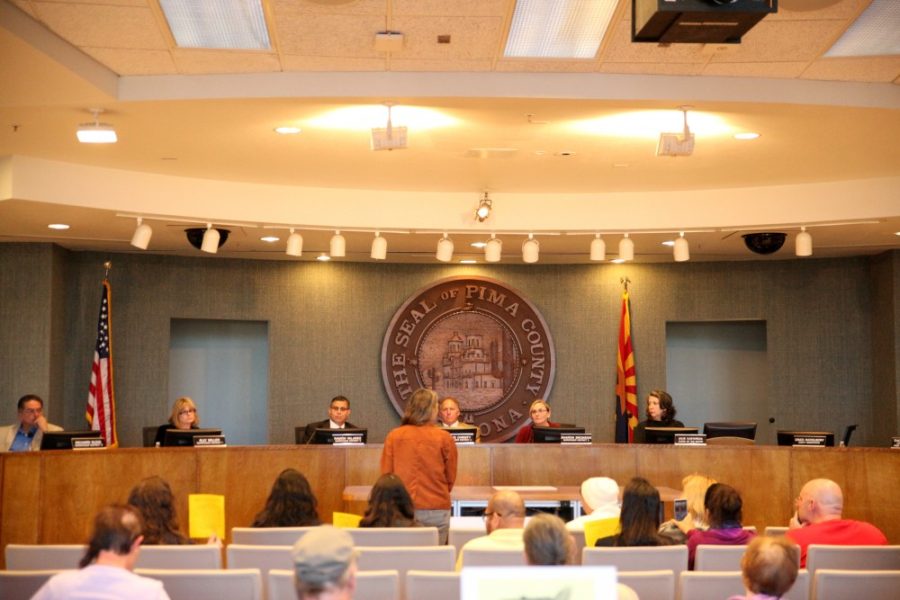
Shane Bekian
The Pima County Board of Supervisors pulled discussion of a deal with the Monsanto Company from their meeting on Tuesday, Feb. 21.
Facing public dissent, Monsanto and the Board of Supervisors withdrew their incentive agreement to bring the international agrochemical company to Tucson.
At this point, Monsanto has no obstacles in moving forward with the project other than a lack of tax breaks. After Monsanto’s decision not to pursue tax breaks, public opposition cannot be further channeled through the authority of the supervisors.
Before the withdrawal statement on Feb. 15, the supervisors planned to discuss and vote on Monsanto’s proposal, the formation of an agricultural community advisory committee and a memorandum of understanding.
After Monsanto’s statement, County Administrator Chuck Huckelberry requested to remove these subjects from the Feb. 21 agenda. This included a memorandum which would have provided quarterly, voluntary and public reporting of Monsanto’s operations.
“Monsanto Company remains committed to partnering with the community in Pima County and we look forward to working with you in the future,” George Gough, Monsanto’s director of government affairs, said in a letter to Huckelberry.
RELATED: Hundreds protest Monsanto’s plans to build greenhouse in Tucson
Monsanto and Pima County began discussions in March 2016 to build a 7-acre greenhouse on part of the 155-acres the company owns in Marana, Arizona. The research facility and farm would be used to develop new corn seed strains year around.
Huckelberry submitted a memorandum in Nov. 2016 to the Board of Supervisors recommending they approve lower property taxes under a Foreign Trade Zone agreement in order to incentivize Monsanto to complete the project.
Under FTZ, Monsanto would have paid a 5 percent property tax rate for 10 years instead of the usual 15 percent rate. Even with this lower rate, the county would collect more tax revenue on the land.
“The Monsanto proposal serves to expand the tax base and create jobs, while not risking the resident of Pima County’s health, safety, or welfare,” Huckelberry said in his memoranda.
Monsanto promised to spend $90 million in developing the facility and hire 25 full-time and 25 part-time employees with average annual salaries of $44,000 and $35,000 respectively.
“The proposal brings jobs, there are fifty jobs associated with it, to the community and it increases the tax base,” said Mark Evans, Pima County public communications manager.

According to Evans, the deal will also affect the tax rate of Pima County residents since the community can raise the same amount of money at a lower rate with the taxes from Monsanto.
One of the major benefactors from the increased tax revenue will be the Marana School District. Monsanto has also pledged to donate $500,000 to the district’s educational foundation, according to Huckelberry.
Not everyone in the community supported providing tax breaks to Monsanto or their plan to open operations in Pima County.
Megan Mills-Novoa, a member of the leadership council of the Pima County Food Alliance, began a Change.org petition against Monsanto tax breaks, which has garnered 2,076 signatures.
“We believe this deal is a threat to our local food system and our recent designation as a UNESCO City of Gastronomy,” Mills-Novoa wrote in her petition.
Signatories of the petition reflected Mills-Novoa’s concerns of a lack of transparency by the supervisors and the risk of corporate interests overshadowing the local community.
“It’s no secret Monsanto’s predatory nature and history of harassment and litigation against small local farmers,” Jennifer Linden, a local Tucsonan, wrote when she signed the petition in Nov. of 2016.
RELATED: Urban agriculture: feeding the future
In response to public outcry, the supervisors organized five town hall meetings in order to allow the community a chance to share their voice.
Rep. Raul Grijalva, D-Ariz., shared the opposition to the proposed tax incentives.
“Monsanto’s legacy of toxic environmental impacts, heavy-handed approaches to farmers’ reuse of seeds, and $80 million in SEC fines for this year alone raise serious concerns,” Grijalva said in a letter to supervisors.
Gough responded to the concerns raised by the public in a letter to Huckelberry in a Dec. 2016 on behalf of Monsanto.
“We welcome a genuine constructive conversation with diverse ideas and perspectives about food and agriculture production,” Gough said.
He described the company’s plans to construct a sustainable facility which utilizes the Arizona climate to its advantage.
Gough also provided sources to help assure residents of the environmental safety of the operation and touted its proposed economic benefit to the community.
The supervisors’ response to public opinion on the deal was limited by the law.
According to a memorandum created by John Moffat, director and Patrick Cavanaugh, Deputy Director of the Pima County Economic Development Office, the supervisors could not stop Monsanto from buying land or constructing a greenhouse and have limited regulatory authority over Monsanto use of the land.
Follow Randall Eck on Twitter.